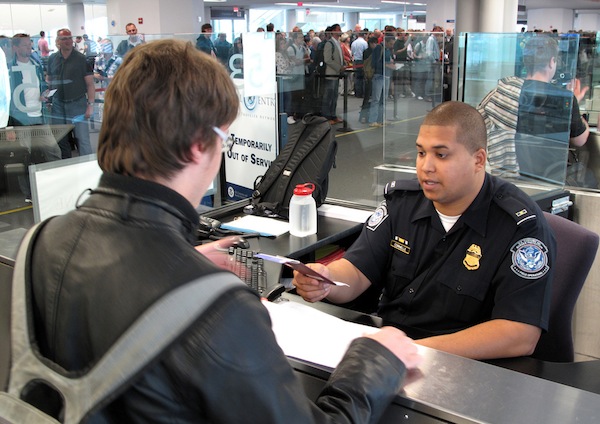
June 29th, 2017 | cairclev
Our attorneys assist Muslims who have been profiled, discriminated against or unduly detained at border crossings, airports, and in other similar circumstances. This FAQ discusses your rights when traveling through the U.S. border.
Can U.S. customs officers ask questions about my religious beliefs and practices or political opinions?
Religious and political beliefs, associations, and practices are protected by the First Amendment. However, customs officers have sometimes asked Muslim travelers about their religious affiliation, religious practices, association with religious institutions, and political opinions.
If you are a U.S. citizen or lawful permanent resident, you do not have to answer questions about your religious beliefs and practices or political opinions, and you cannot be denied entry to the United States for declining to answer such questions. If customs officers persist in asking you such questions, you can request to see a supervisor.
If you are a non-citizen visa holder, you may decline to answer general questions about your religious beliefs and political opinions, but doing so may lead to delay or additional questioning, or possibly denial of your entry into the country. If you are told you cannot enter the country and you fear you might be persecuted or tortured if you are sent back to the country from which you traveled, you may tell the customs officer about your fear and ask for asylum.
Do I have to provide my laptop passwords or unlock my mobile phone for law enforcement officers? Can law enforcement officers search my electronic devices or make copies of the files?
Some travelers are asked to provide their laptop passwords or unlock their mobile phones. Whether you have a right to decline to provide this information is a contested legal issue. The extent to which officers have the authority to search or copy files in your electronic devices without any reasonable suspicion that the devices contain evidence of wrongdoing is also a contested issue.
U.S. citizens cannot be denied entry to the United States for refusing to provide passwords or unlock devices, but refusal to do so might lead to delay, lengthy questioning, and/or officers seizing your device for further inspection.
For lawful permanent residents and non-citizen visa holders, refusing to cooperate might also lead to officers denying your entry into the country. If an officer searches and/or confiscates your laptop or cell phone, write down his or her name and get a receipt for your property.
What do I do if I am selected for secondary screening every time I travel by air and I believe I am on a “no-fly” or other “national security” list?
If you believe you are mistakenly on the no fly list or another watch list, contact us and we will help you file a TRIP complaint with TSA using the Traveler Redress Inquiry Process. More information is available here.
If I am entering the U.S. with valid travel papers, can law enforcement officers stop and search me?
Generally, customs officers may stop, detain, and search any person or item at the border. This is true even if there is nothing suspicious about you or your luggage. The government believes this authority to search without individualized suspicion extends to searches of electronic devices such as laptops and cell phones, but that is a contested legal issue. Officers, however, may not select you for a personal search or secondary inspection based on your religion, race, national origin, gender, ethnicity, or political beliefs.
What if I’m selected for secondary screening?
Customs officers have the authority to ask your immigration status when you are entering or returning to the United States or leaving the country. They have the power to determine whether non-U.S. citizens and lawful permanent residents have the right to enter the country. These questions are generally asked of all travelers during primary screening.
If you are selected for further screening, called secondary screening, your right to refuse to answer questions depends on your immigration status:
If you are a U.S. citizen and you have presented a valid passport, you do not have to answer officers’ further questions, although refusing to answer routine questions about the nature and purpose of your travel could result in delay and/or further inspection. You have the right to request to speak to an attorney before answering any questions that go beyond proof of your immigration status.
If you are a lawful permanent resident, we recommend you answer officers’ questions. Your right to counsel at the border is not the same as a US citizen and thus CBP officers may not allow you to call an attorney. If CBP attempts to deny you entry you should ask to speak to the supervisor in charge of LPR admissions. You should never sign an I-407 form (relinquishing your green card).
If you are a non-citizen visa holder, you may be denied entry into the United States if you refuse to answer officers’ questions. Officers, however, may not select you for questioning based on your religion, race, national origin, gender, ethnicity, or political beliefs. If you are told you cannot enter the country and you fear you might be persecuted or tortured if you are sent back to the country from which you traveled, you may tell the customs officer about your fear and ask for asylum.